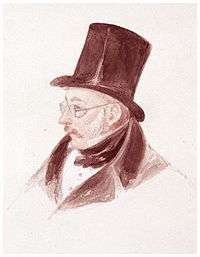William Hay Macnaghten

Sir William Hay Macnaghten, 1st Baronet (24 August 1793 – 23 December 1841) was a British civil servant in India, who played a major part in the First Anglo-Afghan War.
He was the second son of Sir Francis Macnaghten, Bart., judge of the supreme courts of Madras and Calcutta, and was educated at Charterhouse. He went to Madras as a cadet in 1809, but in 1816 joined the Bengal Civil Service. He displayed a talent for languages and published several treatises on Hindu and Islamic law. His political career began in 1830 as secretary to Lord William Bentinck; and in 1837 he became one of the most trusted advisers of the governor-general, Lord Auckland, with whose policy of supporting Shah Shuja against Dost Mahommed Khan, the reigning amir of Kabul, Macnaghten became closely identified.
He was created a baronet in 1840, and four months before his death was nominated to the governorship of Bombay. As a political agent at Kabul, he came into conflict with the military authorities and subsequently with his subordinate Sir Alexander Burnes. Macnaghten attempted to placate the Afghan chiefs with heavy subsidies, but when the drain on the Indian exchequer became too great, and the allowances were reduced, this policy led to an outbreak. Burnes was murdered on 2 November 1841; and under the elderly General William Elphinstone, the British army in Kabul degenerated into a leaderless mob.
Macnaghten tried to save the situation by negotiating with the Afghan chiefs and, independently of them, with Dost Mahammad's son, Akbar Khan, by whom he was captured and, on 23 December 1841, assassinated by Khan placing a pistol in Macnaghten's mouth. This very soon became an inspirational story among the Afghans, with the disastrous retreat from Kabul and the Massacre of Elphinstone's army in the Khurd-Kabul Pass following. These events threw doubt on Macnaghten's capacity for dealing with the problems of Indian diplomacy, though his fearlessness and integrity were unquestioned.
Appearances in fiction
Macnaghten appears in the first volume of the Flashman Papers, being depicted as ambitious, arrogant and a megalomaniac.
He also appears in To Herat and Cabul by G. A. Henty. He is pictured as a brave man, but clueless about Afghan politics. Henty places the blame for convincing Lord Auckland, the Governor-General of India, to place Shuja on the throne squarely on his shoulders.
References
| Wikisource has original text related to this article: |
| Wikisource has original text related to this article: |
-
 This article incorporates text from a publication now in the public domain: Chisholm, Hugh, ed. (1911). "Macnaghten, Sir William Hay". Encyclopædia Britannica. 17 (11th ed.). Cambridge University Press. pp. 264–265.
This article incorporates text from a publication now in the public domain: Chisholm, Hugh, ed. (1911). "Macnaghten, Sir William Hay". Encyclopædia Britannica. 17 (11th ed.). Cambridge University Press. pp. 264–265. - Prior, Katherine (2004). "Macnaghten, Sir William Hay, baronet (1793-1841)". Oxford Dictionary of National Biography. Oxford University Press. Retrieved 2006-08-03. (subscription or UK public library membership required)